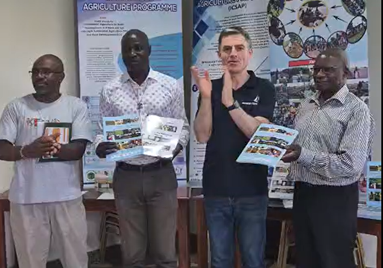On the eve of this year’s United Nations Climate Change Conference, COP27, held this year in Sharm El-Sheikh, Egypt from November 6 to 18, we are republishing a recent guest blog post by Victoria Reynal, Sustainability Consultant at the Jesuit European Social Centre (JESC) in Brussels. Appearing originally on the JESC website on October 6th, her blog offers both analysis of the need for urgent movement to address the climate crisis, as well as tangible opportunities for individual action.

Time to Act Decisively to Confront Climate Crisis, by Victoria Reynal, Sustainability Consultant at the Jesuit European Social Centre (JESC)

In early November (6-18), in the midst of an increasingly dangerous climate crisis, the UN Climate Change ‘Conference of Parties’ will take place in Egypt. The stakes are high for the 27th conference (COP27) and the need to overcome differences and work collaboratively is crucial. At this time, each one of us has the power to help build momentum and push for stronger political will and more ambitious climate action.
The effects of climate change are increasingly tangible, severe, and widespread. Almost 8 million people have been displaced from their homes, and over 1,500 have died due to the recent floods in Pakistan. Droughts, cyclones and wildfires have been devastating communities across the world.
Despite alarming evidence, our collective response is not nearly enough. There is still more investment in fossil fuels than in climate mitigation and adaptation. Simply said, this means we are feeding the problem more than we are the solution.
Cardinal Michael Czerny SJ, Prefect of the Vatican’s Dicastery for Promoting Integral Human Development, has noted that: “the planet already is 1.2°C hotter, yet new fossil fuel projects every day accelerate our race towards the precipice.”
Experts and scientists have referred to the 2020s as the critical decade for climate action. If we are to keep global warming within the 1.5° C limit (as set in the Paris Agreement, in line with the scientific consensus), we must reduce our greenhouse gas (GHG) emissions at least by half by 2030.
At COP 26 in Glasgow last year, countries agreed to present more ambitious plans to reduce their emissions, referred to as Nationally Determined Contributions (NDCs). However, few countries have done so. If we add up the plans presented so far by countries and model the expected GHG emissions, the global temperature rise will go beyond 2°C by 2100.
The consequences of such an increase are hard to predict, even for scientists, yet they represent a threat to life as we know it. “We have a choice. Collective action or collective suicide. It is in our hands”, as Antonio Guterres, United Nations Secretary General, put it.
COP27 “represents the next opportunity for all to join in promoting the effective implementation of the Paris Agreement”, in the words of Pope Francis.
We cannot have it that COP27 is another complicated, bureaucratic summit resolving nothing: among the main issues that need to be addressed are:
- Raising ambition on climate action, so that countries commit to reducing their GHG emissions more aggressively, at least in line with the 1.5°C Paris Agreement target. The responsibility of the G20 is especially relevant since these countries emit 75% of GHG.
- Finding and developing a proper way for countries to collaborate and implement targets, so that they do not remain merely as goals but actually lead to reduced emissions.
- Agreeing on and establishing a Loss and Damage facility for developed countries to provide financial support to vulnerable countries that are already suffering the effects of climate change.
An estimated 35,000 people attending COP27 will include delegates from more than 190 countries, NGOs, intergovernmental organisations, UN specialised agencies, private companies and media. The agenda includes a world leaders’ summit, panel discussions, roundtables, side events, press conferences, plenaries, and negotiations.
Parties organise themselves in negotiating groups according to their interests and/or circumstances. Some of the most important negotiating groups are: the G77 and China, which includes developing countries and China; the Umbrella Group, which represents several developed countries; and the European Union.
There are a number of challenges to the successful outcome of COP27. The Russian Federation’s war on Ukraine has led to economic setbacks, as well as energy security and food security problems. The resulting energy supply difficulties have led some states to a return to coal consumption, the worst offender among fossil fuels. Due to this complex geopolitical context with its associated challenges, climate change is not as high in the political agenda as it ought to be.
Another difficulty is the distrust among countries and negotiating groups for several reasons, including unfulfilled promises and targets, such as on Climate Financing from developed countries to developing countries. Furthermore, most developed countries do not want to commit to providing Loss and Damage finance (arguing that there are other existing mechanisms to provide funding), while developing states contend that such systems are not working. Moreover, countries ask themselves why it should be them reducing emissions and not others, as explained by Tom Evans, climate diplomacy researcher at E3G think tank.
UN Secretary-General Antonio Guterres recently warned that “we are in a life-or-death struggle for our own safety today and our survival tomorrow.”
“We are in a life-or-death struggle for our own safety today and our survival tomorrow.”
-UN Secretary-General Antonio Guterres
There is a clear and urgent need for climate action at COP27. Our representatives must agree on how to reduce GHG emissions by half by 2030.
“The success of the UNFCCC and the Paris Agreement is vital to securing a future for all peoples across the world”, according to a COP reflection paper recently published by senior African church figures.
Our representatives must agree on a Loss and Damage facility to provide funding for those suffering the effects of climate change today. And each of us can play a role in helping the COP be as successful as possible, by helping put climate change high in the political agenda and pushing our politicians to commit to ambitious climate targets.

Some opportunities for action include:
- Signing the Fossil Fuel Non Proliferation Treaty. As Cardinal Michael Czerny SJ has stated: “The proposed Fossil Fuel Non proliferation Treaty holds great promise to complement and enhance the Paris Agreement.”
- Enrolling in the Laudato Si Action Platform to work together towards sustainability.
- Making (or strengthening) lifestyle changes to reduce your carbon and overall environmental footprint and sharing them to inspire others to change. For ideas on lifestyle changes, see the UN Act Now website.
- Finding, supporting, and joining local or national movements that are asking for enhanced climate action.
- Learning about additional ways you can make a difference.


